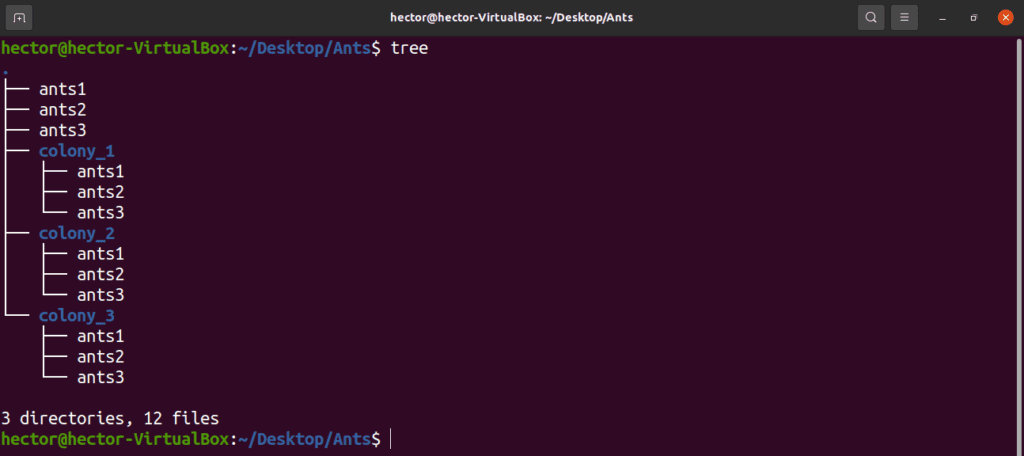

file2 Here, x extract v verbose f filename (test.tar) Extracting specific files from the tar file You can also extract a specific file from the tar file instead of extracting the entire tar file. $ for program in tar unzip untar do # You could simply add to this list. To extract the entire contents of the tar file to the current directory, we can type: tar xvf test.tar. You could use variants of this for loop, if you like adventure :-) # In case of compressed files inside compressed files this will Use a looping construct to decompress each file.ĭecompress all files in the current directory: $ for file in `ls -1` doĭecompress all archives in the current directory and any subdirectories (my personal favorite): $ for file in `find *` doĭecompress all archives recursively and do the same again for any remaining: # Make the above loop a function to be called more than once Use bash and the utility find to output to the console a list of all contents from the present directory. unix shell script for loop exampleĪwk command in Unix : Awk command in Unix or Linux is a powerful command for processing text.You want to decompress all compressed files inside a directory and all its subdirectories. Unix shell script for loop example : what is loop statement in Unix shell scripting,what are different type of statement with examples. Complete description is given for each of the command Sed command in unix examples : sed command is a Stream Editor – works as a filter processing input line by line And here are 32 Useful sed command examples in Linux/Unixīasic unix command :Unix Script Tutorial for basic unix command which are used many times. Same are applicable for Linux also.How to kill the process Linux command for Oracle DBA : This page has useful Unix command for Oracle DBA to help you in your day-to-day activities.
#Untar in linux how to#
Unzip tar.gz file in Linux : Check out this post on how to create ,list and unzip Tar.gz file in Linux, how to use bzip2 compression, how to compress and extract using other options So basically you can create jdk directory in any folder by this approach while by first approach,it will always created in /home/oracle/ The files will be extracted in the current folder (most of the times in a folder with the name ‘file-1.0’). It create a tar file of jdk and its all inside directory in the current directly where the command is executed Type at the command prompt tar xzf - to uncompress a gzip tar file (.tgz or. tar -tvf archive.tar List all files in archive.tar verbosely. tar was originally developed in the early days of Unix for the purpose of backing. Now if you take the tar backup like this cd /home/oracle/ tar -cf archive.tar foo bar Create archive.tar from files foo and bar. Then It will create file in the same relative path It create a tar file of/home/oracle/jdk and its all inside directory in the current directly where the command is executed (1) The relative path is important while extracting file from tarĮxample tar -cvf user_dir.tar /home/oracle/jdk In the extracted working directory are tar files. To uncompress the tar.gz file and put resulted files in a different directory, say /tmp/archive, you need to add a -C option at the end of the command: tar xvzf -C /tmp/archive The -C option is used to specify a different directory other than the current working directory.

For instance, an open file Publichtml-14-09-12 could be untarred by using the below command.

#Untar in linux archive#
Tar rvf host_dir.tar new.txttar rvf host_dir.tar new/įew important things to note down for tar command line In Linux, you can extract or untar tar archive files if the following command is run as an ext (extract).

This option will list all of the files one by one in the archive. Where, x: This option tells tar to extract the files. Extract a single directory from tar tar -xvf user_dir.tar /home/oracle/network/admin/ħ.Extract group of files from tar using regular expression tar -xvf oracle_hom.tar -wildcards '*.ora'Ĩ. Adding a file or directory to an existing archive using option -r 1) If your tar file is compressed using a gzip compressor, use this command to uncompress it. To extract files from tar file: $tar -xvf user_dir.tarĤ.To tar files as per include options: $tar -cvf user_dir.tar -I list_of_filesĥ. Extract a single file from tar tar -xvf user_dir.tar /home/oracle/network/admin/tnsnames.oraĦ. Lists the contents of the tar file created. Using the tar Command to Create an Archive of Your Home Directory.


 0 kommentar(er)
0 kommentar(er)
